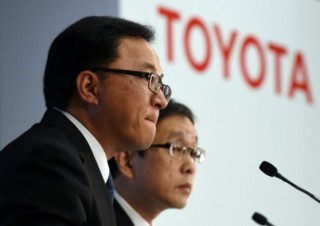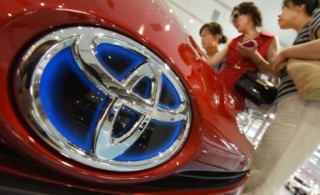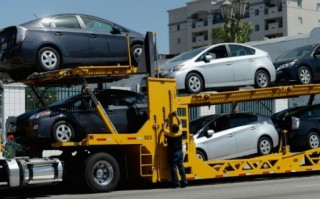Loading
Search
▼ Toyota's Q1 Profit Dented by Yen Rally, North American Sales Drop
- Category:Other
TOKYO — Toyota on Thursday posted a nearly 15 percent drop in its April-June net profit, hit by a sharp rally in the yen and falling North American vehicle sales.
The world’s biggest automaker also trimmed its full-year profit and sales forecasts, underscoring the negative impact that a resurgent currency is having on firms doing a lot of business abroad. Japan’s exporters reaped windfall profits over the past few years as government efforts to kickstart the world’s number three economy sharply weakened the yen.
That was good for firms such as Toyota and rivals Honda and Nissan because repatriated foreign profits were worth more when the yen was weak and it boosted their competitiveness overseas.
But the currency has rallied since the start of the year as volatile equity markets and Britain’s vote to exit the European Union boosted demand for a unit widely seen as a safe investment.
The world’s biggest automaker also trimmed its full-year profit and sales forecasts, underscoring the negative impact that a resurgent currency is having on firms doing a lot of business abroad. Japan’s exporters reaped windfall profits over the past few years as government efforts to kickstart the world’s number three economy sharply weakened the yen.
That was good for firms such as Toyota and rivals Honda and Nissan because repatriated foreign profits were worth more when the yen was weak and it boosted their competitiveness overseas.
But the currency has rallied since the start of the year as volatile equity markets and Britain’s vote to exit the European Union boosted demand for a unit widely seen as a safe investment.
On Thursday, Toyota reported a 552.5 billion yen ($5.4 billion) net profit in its fiscal first quarter, well down from 646.4 billion yen in the same period last year.
Revenue fell 5.7 percent to 6.59 trillion yen.
The Corolla and Prius hybrid maker, which also reported a fall in operating profit, cited the yen as a key reason for tweaking its outlook for the fiscal year to March 2017.
Revenue fell 5.7 percent to 6.59 trillion yen.
The Corolla and Prius hybrid maker, which also reported a fall in operating profit, cited the yen as a key reason for tweaking its outlook for the fiscal year to March 2017.
It now expects net profit of 1.45 trillion yen on revenue of 26.0 trillion yen, compared with 1.5 trillion yen and 26.5 trillion yen previously forecast.
The newest figure, which would be Toyota’s first profit decline in five years, is way down from a record 2.31 trillion yen net profit in the most recently ended business year.
“The yen’s rise is the top concern for Japan’s auto industry right now,” said Rakuten Securities analyst Yasuo Imanaka.
“On top of that, demand in North America—the industry’s cash cow—seems to be losing momentum.
The newest figure, which would be Toyota’s first profit decline in five years, is way down from a record 2.31 trillion yen net profit in the most recently ended business year.
“The yen’s rise is the top concern for Japan’s auto industry right now,” said Rakuten Securities analyst Yasuo Imanaka.
“On top of that, demand in North America—the industry’s cash cow—seems to be losing momentum.
“It’s going to be a tough year for the industry.”
Toyota’s vehicle sales rose slightly in the latest period to 2.52 million units, ticking up in Japan, Europe and Asia.
Meanwhile, sales in China, the world’s biggest vehicle market, were up 14 percent on-year in the six months through June, the company said.
Toyota managing officer Tetsuya Otake acknowledged that the surging yen, “rather weak” emerging markets, and Britain’s EU departure posed risks for the company.
“But we’re not pessimistic about the industry,” he told a press briefing in Tokyo Thursday.
Still, vehicle sales fell in the key North American market, where cheap oil has hit demand for Toyota’s fuel-efficient offerings, including the Prius.
Japanese automakers have benefited from healthy growth in the US where low interest rates boosted demand, although a possible hike in borrowing costs this year could dig into sales.
Unsteady demand in emerging markets such as Thailand and Indonesia are also red flags, as Toyota and other major automakers wrestle with costs linked to a huge scandal at supplier Takata.
A defect in the firm’s airbags has been linked to 13 deaths and scores of injuries globally, prompting a massive recall to replace the problem parts and meaning huge expenses for automakers.
Automakers were also hit by temporary factory shutdowns in the south of Japan after a pair of earthquakes caused major damage and claimed dozens of lives in April, affecting production.
Toyota’s biggest domestic rivals likewise reported a drop in their quarterly results.
On Tuesday, Honda blamed an income tax rise for its April-June net profit slipping 6.1 percent to 174.6 billion yen, although that beat market expectations partly owing to stronger sales in China.
Last week, Nissan posted the first decline in April-June net profit in four years, citing the strong yen and struggles in its home market. Its bottom-line figure was down 11 percent to 136.4 billion.
© 2016 AFP
Toyota’s vehicle sales rose slightly in the latest period to 2.52 million units, ticking up in Japan, Europe and Asia.
Meanwhile, sales in China, the world’s biggest vehicle market, were up 14 percent on-year in the six months through June, the company said.
Toyota managing officer Tetsuya Otake acknowledged that the surging yen, “rather weak” emerging markets, and Britain’s EU departure posed risks for the company.
“But we’re not pessimistic about the industry,” he told a press briefing in Tokyo Thursday.
Still, vehicle sales fell in the key North American market, where cheap oil has hit demand for Toyota’s fuel-efficient offerings, including the Prius.
Japanese automakers have benefited from healthy growth in the US where low interest rates boosted demand, although a possible hike in borrowing costs this year could dig into sales.
Unsteady demand in emerging markets such as Thailand and Indonesia are also red flags, as Toyota and other major automakers wrestle with costs linked to a huge scandal at supplier Takata.
A defect in the firm’s airbags has been linked to 13 deaths and scores of injuries globally, prompting a massive recall to replace the problem parts and meaning huge expenses for automakers.
Automakers were also hit by temporary factory shutdowns in the south of Japan after a pair of earthquakes caused major damage and claimed dozens of lives in April, affecting production.
Toyota’s biggest domestic rivals likewise reported a drop in their quarterly results.
On Tuesday, Honda blamed an income tax rise for its April-June net profit slipping 6.1 percent to 174.6 billion yen, although that beat market expectations partly owing to stronger sales in China.
Last week, Nissan posted the first decline in April-June net profit in four years, citing the strong yen and struggles in its home market. Its bottom-line figure was down 11 percent to 136.4 billion.
© 2016 AFP
- August 5, 2016
- Comment (0)
- Trackback(0)





